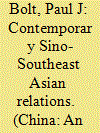| Srl | Item |
| 1 |
ID:
067079


|
|
|
|
|
| Publication |
London, Lynne Rienner, 2006.
|
| Description |
ix, 221p.
|
| Standard Number |
1588263681
|
|
|
|
|
|
|
|
|
|
|
|
Copies: C:1/I:0,R:0,Q:0
Circulation
| Accession# | Call# | Current Location | Status | Policy | Location |
| 050443 | 355.8251190951/BOL 050443 | Main | On Shelf | General | |
|
|
|
|
| 2 |
ID:
109480


|
|
|
|
|
| Publication |
2011.
|
| Summary/Abstract |
China's growth has brought important benefits to Southeast Asia. China's "new diplomacy" has accommodated many of the region's political concerns and its economic expansion has been an engine of growth for Southeast Asia. However, China's rise brings challenges as well. China's rapid naval build-up, more intensified disputes in the South China Sea, environmental problems and questions over China's ultimate goals create concerns in the region. Southeast Asia's strategy has been to accommodate China's rise while striving to maintain the American position in the region. Southeast Asia has been successful in this strategy, although this balance will be increasingly difficult as China's power increases.
|
|
|
|
|
|
|
|
|
|
|
|
|
|
|
|
| 3 |
ID:
050342


|
|
|
|
|
| Publication |
Feb 2004.
|
| Summary/Abstract |
Many security analysts believe advances in information technologies are producing changes in economy, government, and society that make information warfare an important aspect of the conflict between China and Taiwan. This study introduces the concept of information warfare and finds that Chinese and, to a lesser extent, Taiwanese strategists have developed distinctive approaches to it. Despite limited technological resources and a reputation for political constraints on innovation, China made early efforts to adopt technologies, organizational forms, and strategies to facilitate information warfare. In the event of war, Beijing hopes to disrupt advanced Taiwanese and American network-dependent economies, governments, and militaries while protecting access to the more limited information it requires. Taiwan is building information warfare capabilities by drawing on both its advanced information technology firms and US assistance. American policymakers should take steps to prevent the emergence of information warfare in the context of the cross-strait rivalry from undermining deterrence and crisis stability.
|
|
|
|
|
|
|
|
|
|
|
|
|
|
|
|